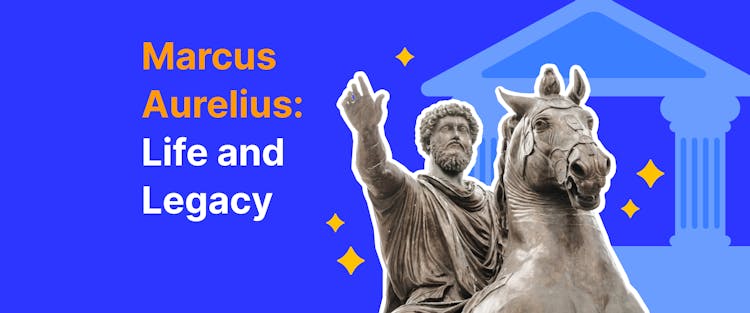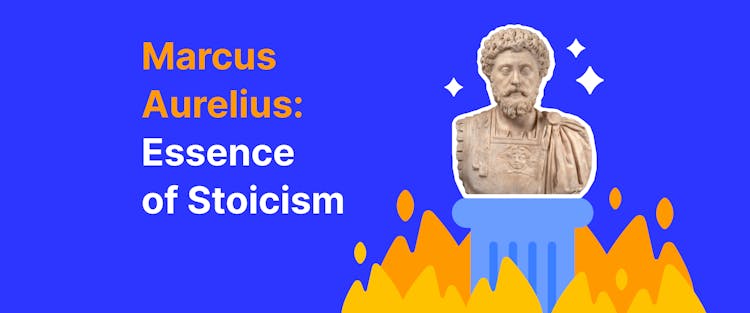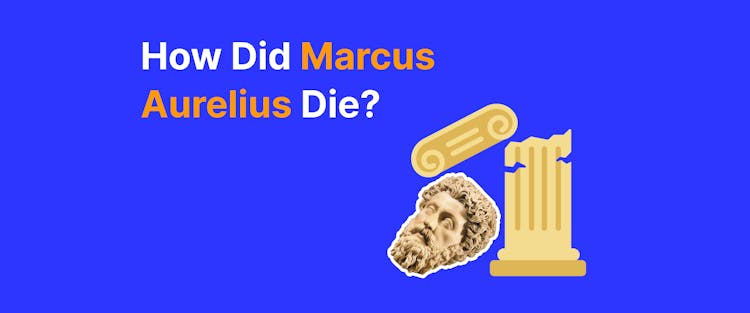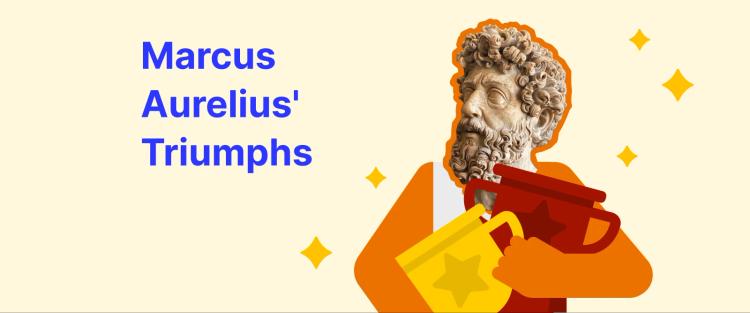The thoughts Marcus Aurelius shared with the world in his diary titled "Meditations" were born out of his uneasy, sorrowful life. This Roman emperor literally mastered the art of living through blood, sweat, and tears. Even one event from what he endured would bring anyone to their knees, barely able to keep on living. Yet, "one of the five good emperors" lived up to what it meant to be a true Stoic leader, defying the challenges of ruling the Western world. Marcus Aurelius' legacy of endurance and self-control transcends through the ages. It remains relatable as he touches upon subjects that every human being faces: life, death, and the essential matters in between.
Marcus Aurelius' diary editions: "Meditations" for everyone
The adaptability of Marcus Aurelius' diary, with its most popular title being "Meditations," is a testament to the author and editors' efforts to make it relatable. This adaptability is evident in how its structure and name are adjusted to suit different target audiences. For instance, the "Thoughts of Marcus Aurelius Antoninus" version was specifically edited with school-age children in mind. The emperor's appreciation for his teachers in "Meditations" underscores his belief in the importance of imparting wisdom from an early age:
"Thanks to Diognetus, I learned not to be absorbed in trivial pursuits."

Marcus Aurelius was eleven when a painter and philosopher, Diognetus, was passing on his wisdom to him. Meanwhile, growing up suggests a progressing ability to interpret close to the original, "adult" version of the "Meditations" as a collection of deep personal thoughts. It explains the annotated structure of Penguin Classics "Meditations: Marcus Aurelius." A more modernized content-presentation design of "Marcus Aurelius - Meditations: Adapted for the Contemporary Reader" serves the mission of delivering these reflections to the audience of the 21st century.
The Headway app recommends perusing the latest published version of "Meditations," titled "Meditations: A New Translation." The team who prepared this "modern library classics" edition kept in mind that the original Greek version of Marcus Diary's diary was not intended for publication. A particular emphasis is placed on practical guidance on how people living back then and now should cope with adversities and use them for daily personal growth. Another critical point Marcus Aurelius presented in all of the editions is to manage relationships with others with utmost respect toward them. At the end of the day, we all live on one earth, and only joint efforts can sustain a lasting peace.
Unveiling the king-philosopher: Respect to life
The contributions of Marcus Aurelius to the Stoic philosophy deservedly placed him right next to its founder. This philosophy implies endurance to all kinds of torments. Nevertheless, a Cyprus-native Zeno, the original forefather of Stoicism, highlighted that if circumstances turn overbearing, a person unable to grow through them should "voluntarily" depart from life. Zeno eventually did this to himself, surprising Epicurean writers and poets like Horace, who looked up to the Stoic theorist. And yet, Marcus Aurelius chose to never toy with the thought of suicide but placed the primary value on staying alive no matter what fate throws your way:
"Let no emotions of the flesh, be they of pain or pleasure, affect the supreme and sovereign portion of the soul."

The ruler of Rome modified and softened Stoicism's initial "bedrock tenets" by transforming them into relatable ideas for thinkers with a more realistic and practical turn of mind. For example, one of the central doctrines constituting the bulk of the "Meditations" of Marcus Aurelius is "universal brotherhood" and "interconnectedness of all things":
"All things are interwoven with one another; a sacred bond unites them; there is scarcely one thing that is isolated from another. Everything is coordinated; everything works together in giving form to the one universe."

"The world order is a unity made up of multiplicity: God is one, pervading all things; all beings are one, and all laws are one."

Those thoughts suggest that person should work on their neighborliness and self-control throughout their lives.
Marcus Aurelius' early life and ascension to power
Marcus Aurelius (A.D. 121-161) learned the toll of countless deaths early, which sadly was a common experience for Roman leaders. It started with his parents. His grandfather, uncle, wife Faustina, their children, his adopted brother Verus, who was also the co-emperor, and thousands of his subjects affected by incurable Antonine plaque followed afterward. Despite this, the efforts of the most brilliant educators while Rome's heir was ascending to power shaped his mind into one of great humanity and natural humility.
His rule to "be good" seemed born from realizing how fragile and fleeting human life is. Hence, he learned that the best strategy is to refrain from imitating others who wrong you:
"To refrain from imitation is the best revenge."

Hence, being unnecessarily rude and making it your governance style means merely investing in regrets that inevitably follow after those treating you with contempt die. Therefore, unlike classic Stoic philosophy, Marcus Aurelius saw death as merely a phase of human life on earth, not a way out if reality gets unbearably depressive.
Battle of titles: Original title of "Mediations" diary
Marcus Aurelius was determined to modify an original Stoicism. In "Meditations," he integrated some moral principles resembling Christian ideas, which were gaining influence at the time. Listening to others and obeying a Supreme power seemed no less critical to Marcus than his sense of duty. Such a transition character might have allowed his future publishers to speculate on the name of "Meditations."
When Aurelius started writing his famous piece two years before Verus' (his co-ruler) death, he found himself melancholic in the Dunabe region. The emperor helped suppress the revolt of Avidius Cassius and searched for an outlet for his weary heart. This is when "To Himself," the original of "Meditations," was born. "To Himself" represents the initial title of "Meditations," which unified hundreds of thoughts, reflections, and musings on life, death, and personal struggles as one grows into a more experienced individual:
"You could leave life right now. Let that determine what you do and say and think."

The fact that the Roman leader seems never to have named it himself differently implies that all the speculations about the most "original" editing version and title do not hold water.
Personal growth with the thoughts of Marcus Aurelius: Watch out for your mind and discipline
Some of the most frequently repeated accents that the author of "Meditations" makes are set on the consistency of discipline and the state of mind that disregards the opinions of others and prioritizes self-focus to grow as a strong personality and a "good man." The philosopher urges us to shine with kindness and virtues to warm others in bad and good times "until we are extinguished," whether it is a roaring flame or a tiny spark because of our complicated personal situation. Here are some examples of his thoughts on those critical subjects:
Quotes on discipline
"Does the light of a lamp shine and keep its glow until its fuel is spent? Why shouldn't your truth, justice, and self-control shine until you are extinguished?"

"The man of ambition thinks to find his good in the operations of others; the man of pleasure in his sensations; but the man of understanding in his own actions."

"Keep yourself simple, good, pure, serious, and unassuming; be a friend of justice and godliness; be kind, affectionate, and resolute in your devotion to duty."

"What follows is ever closely linked to what proceeds."

"Make your rules of life brief... but embrace fundamentals."

Quotes on the mind
"Dig inside yourself. Inside, there is a spring of goodness ready to gush at any moment if you keep digging."

"To the mind, the only things not indifferent are its own activities as they are under its control. Its sole concern is with those of the present moment."

"Life is short, and this earthly existence has but a single fruit to yield - holiness within and selfless action without."

"Be in all things Antoninus's disciple... wholly free from nervousness, suspicion, and over-subtlety."

"The Mind of the universe is social."

How the thoughts of Marcus Aurelius can transform your life today
In Book 2 of the "Meditations," Marcus Aurelius states:
"Were you to live three thousand years, or even ten thousand, remember that the sole life which a man can lose is that which he is living at the moment..."

Here, the king philosopher reminds his reader that the happiness of life should not be determined by the past or future because "the only thing of which any man can be deprived of is the present." People are not meant to live forever here on earth, so there is no sense in being too anxious or regretful about what has happened or is about to happen.
The entire "Meditations" sounds like an affirmation to focus on today and what a person can do to learn from their current challenges and move closer to their best self. Doesn't it sound remarkably relatable? This ultimate relatedness justifies Marcus' status as the great emperor. In this regard, persistence means daily stoic efforts are applied, and people exercise them in practice frequently and devotedly.
Marcus Aurelius recognized the value of diligent everyday training to improve character starting today, not "from the next Monday." He uses the maxim "Memento mori" as a reminder that life comes to its natural end for every living being without exceptions. Postponements only steal our opportunity to grow at this age of our lifetime, and we have no chance to buy these lost years back.
Inner peace as a key to live better now: Advice of a good emperor
Modern life has made most of the U.S. and the world's population struggle with severe anxiety attacks and their variations, mainly because we realize that stopping time or turning it back is beyond our abilities. If one ever loses inner peace or something that constitutes a part of it, Marcus Aurelius advises them to work on restoring it right away:
"If you claim for yourself such epithets as good, modest, truthful, clear-minded, right-minded, high-minded, be careful not to belie them, and if you should happen to forfeit them, lose no time in recovering them again."

Lost chances, deaths of loved ones, and an unending need to survive in a world where kindness and humility seem inferior to independence and pride can easily break any human's spirit. "Meditations" of Marcus Aurelius highlights his struggles with precisely the same questions. To cope with that, he cultivated an inner peace of mind:
"Begin the day by asking yourself, Can the just and right conduct of another make any difference in myself?"

"Dedicates self wholly to the service of justice in (your) personal actions and compliance with Nature in all else. No thought is wasted on what others may say or think."

"Every care, every distraction is laid aside; one only ambition is to walk in the straight paths of law, and by so doing to become a follower of God."

"To go on in your present state, continuing to be torn and soiled... is the way of a fool and a faint heart."

An evergreen legacy of the Marcus Aurelius thoughts: Keep up the good work
Marcus Aurelius' "Meditations," or thoughts left for his descendants as a diary, have preserved their relevance over the centuries. It easily makes the book an evergreen plant growing amidst the alley of different philosophical writings. From the second to the twenty-first century, the work of this good and powerful emperor has remained a must-have in every library around the globe.
"Dig" into yourself through "Meditations" with Headway
Discover great depths of "Meditations" by Marcus Aurelius on Headway, the #1 book reviews and summary app. Over 1600 summaries are ready to enhance and equip you on your daily journey of self-reflection and consistent personal growth. A fresh perspective on Stoic insights may boost your motivation for daily investments into self-control and a more productive quality of your thoughts.










